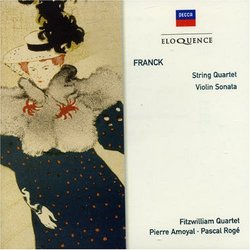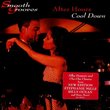IN MEMORIAM CHRISTOPHER ROWLAND
DAVID BRYSON | Glossop Derbyshire England | 02/02/2009
(5 out of 5 stars)
"The Fitzwilliam Quartet was based in Cambridge, and its talented young leader was Christopher Rowland. This quartet recording dates from 1980, but it was in the 1990's that I got to know Dr Rowland as head of chamber music at the Royal Northern College of Music. Each winter he used to put on a set of concerts by his students, taking as its theme either a specific composer, e.g. Mendelssohn, or a certain type of music, e.g. the string quartet. The standard was unfailingly high, and it will not be possible to forget the dominating presence of the tall energetic figure striding around in what seemed to be the only outfit of clothes that he owned and introducing the performers with enormous wit and charm. One year we were told that he was ill, and a few months later we learned that he had died of cancer - I don't suppose he can have been much more than 50. I have owned this magnificent performance of the Franck quartet for many years, and I remember trying to tease Rowland about the sleeve note on the vinyl edition, which complained in passing about the strenuous demands of the way the work is scored. Rowland did not seem to know what I was talking about, and not surprisingly, as it turns out that he had not written the note in question, as I had thought he had.
The point that the viola player (author of the note) made is worth considering more seriously than if he had been just been griping at the hard work this quartet imposes on its players. The double-stopping is more or less constant, and this indicates something important - this quartet has actually moved away from Haydn's concept of four soloists and is really a work for a chamber orchestra of four strings. There is plenty of double-stopping in Brahms's quartets too, I quite agree, far more than Beethoven would have used, but the concept remains basically Haydn's, as it does in the later quartets of Bartok Britten and Shostakovich. Franck's has a different sound to it altogether, and the liner note writer also seems to suggest this point when he says that harmony is as important as melody here. A full-bodied tone is a prime requirement, and the way the Fitzwilliam players rise to that particular challenge, faithfully supported by the recording, is one thing that has commended this performance to me for so long. The other thing is the quality of the composition itself. It is a deeply original work, and it is a deeply beautiful and moving one. The sonata form, bequeathed to mankind by Haydn and Beethoven, its gospel preached by Donald Francis Tovey, is strained to or past its limits here. The melodies are still separate in the traditional manner, but only just. We are starting to hear `continuous melody' as per Wagner, and in something like the style adopted by Faure in his later chamber pieces.
So there are the basic requirements for a group offering Franck's quartet. They must understand the formal structure, they must get the hang of the melodic style, and they must have the biceps to keep the tone strong through a composition nearly 50 minutes in duration. The Fitzwilliam group pass all those tests with flying colours, but most importantly of all they must feel and express the soul of this great work and its creator. How far I can judge of that obviously depends on what my own comprehension amounts to, but for what it is worth you have my word for it that you will find a great interpretation here.
An ideal filler has been selected. Franck's violin sonata is a smaller and lighter work, which is not to say it is a light work. It is in four movements, like the quartet but unlike the symphony and the piano quintet. However these are not four symphonic movements, and the sacred ritual of the Sonata Form is not gone through. The first movement is a lyric, almost a cavatina, the second is vigorous and dramatic, but otherwise totally unlike a Beethoven scherzo, the third has an improvised feel to it, and the last is the gorgeous `chiming canon' that has made this probably the most famous of Franck's compositions other than the symphony and the symphonic variations. This performance dates from 1995. The recording is good, but to my ears not quite as good as the Fitzwilliam players were given 15 years earlier. An easy, indeed facile, description of the performance would be `very French'. The style is cool, and you hear that to best effect right at the start. In the second movement Roge does not try to startle us as Argerich does in the live performance that I have from her and Ricci, and I suspect rightly not. I love that performance, I love Argerich to pieces, she is a great player, but she is not one to imitate. Is the tone here a little lacking in variety? I would not like to answer my own question, but a conscientious review ought at least to ask it. These are formidable custodians of the thesaurus of French chamber music, witness their superb set of the violin sonatas of Faure, so I am not going to rush to any critical judgment of them here. It is a fine performance on any reckoning.
I experience not one instant's hesitation in recommending this disc to anyone who can relate to Cesar Franck at all. He and Dr Christopher Rowland have now joined the ages, both at an earlier age than I have reached as I compose this notice. The living are the living,/And dead the dead shall stay. To them, requiem aeternam et lux perpetua luceat eis. To the rest of us, this music is the very light of life."


